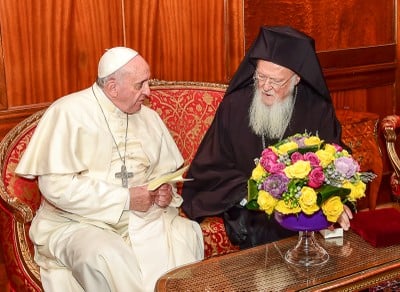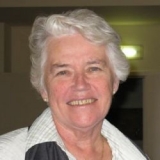- Home
- About us
- Students
- Courses
- Research
- Library
- News & Events
- Gallery
- Contact
- Our Blog
Latest News

World Day of Prayer for Creation

by Sr Dr Margaret Beirne RSC (Associate Professor of Biblical Studies)
Today, 1 September, we celebrate a time-honoured Christian feast day, known as the ‘Feast of Creation’ within the Orthodox Church and today universally celebrated across the ecumenical world as the ‘World Day of Prayer for Creation.’ The earlier title, ‘of creation’ was a feast of thanksgiving to God for the ‘gift of creation’, based on the creation accounts in the first two chapters of the Book of Genesis; the latter, ‘for Creation’ reflects the more recent growing movement of ecological awareness and conversion.
When the Orthodox patriarchate replaced the Byzantine calendar with the ‘anno domini’ of the West in 1728, the significance of the date 1 September was maintained by establishing it as the official beginning of the Orthodox Liturgical Year. Then in 1989, and noting the ‘signs of the times’, the Ecumenical Patriarch Dimitrios expanded the ‘feast of creation’ to a day of prayer ‘for creation’, when the Church offers ‘prayers and supplications to the Maker of all, as thanksgiving for the great gift of Creation and as petitions for its protection and salvation’. (https://ec-patr.org/en/message-of-his-all-holiness-the-ecumenical-patriarch-6/)
From the beginning of his ascent to the Ecumenical Throne on 2 November 1991, the current Ecumenical Patriarch Bartholomew has tirelessly promoted ecology and the environment, earning him the widely acknowledged title of “the Green Patriarch”. This title “was coined and publicised by the media in 1996, and formalised by the then US Vice President, Al Gore… In 2008, His All Holiness ‘was named one of Time Magazine's 100 Most Influential People in the World for “defining environmentalism as a spiritual responsibility”’ (John Chryssavgis, https://www.goarch.org/-/green-patriarch-chryssavgis, 19 August 2025).
In 2015, Pope Francis took up this lead and established the ‘World Day of Prayer for the Care of Creation’ to be celebrated by the Catholic Church each year on 1 September. The Pope’s strong acknowledgement of the Patriarch’s environmental leadership is contained in several of his subsequent annual messages; an example is this excerpt from that of 2016.
“It is most encouraging that concern for the future of our planet is shared by the Churches and Christian communities, together with other religions. Indeed, in past decades numerous efforts have been made by religious leaders and organizations to call public attention to the dangers of an irresponsible exploitation of our planet. Here I would mention Patriarch Bartholomew of Constantinople who, like his predecessor Patriarch Dimitrios, has long spoken out against the sin of harming creation and has drawn attention to the moral and spiritual crisis at the root of environmental problems.”
The following year, on the World Day of Prayer for Creation, Patriarch Bartholomew and Pope Francis issued a joint statement in which, on our behalf, they drew upon Scripture and our current world situation, to offer gratitude to God for the gift of all creation and pledged ‘a commitment to its care and preservation for the sake of future generations… From the Vatican and the Phanar, 1 September 2017.
On 24 May 2018, Pope Francis published his Encyclical Laudato Si’, in which he challenges readers to reflect on a whole range of environmental issues, including the related economic, social, and cultural inequalities of modern society, as indicated by the sub-title, ‘Care of our Common Home’. In several places, he acknowledges the huge contribution to this topic by the Patriarch.
The title of the Encyclical, ‘laudato si’, ‘Praise be…’ is from a famous hymn attributed to St Francis of Assisi (1181-1226) and known as ‘the Canticle of the Sun’ or ‘the Canticle of Creatures’. It is composed as an invitation to every part of creation, the sun, moon, stars, plants, fire and water, animals, men and women, to offer praise to God. A major follow-on from this encyclical is the global Laudato Si’ Movement which offers regular reflections and resources to continue the momentum of the encyclical.
This strong ecumenical leadership was recently recognised by the Order of Friars Minor, a Catholic religious order founded by St Francis. On 30 May this year, they commemorated the 8th centenary of the Canticle, and the tenth anniversary of Laudato Si’. Present at the ceremony in Rome, was His All-Holiness Patriarch Bartholomew who was awarded the Laudato Si’ award ‘for his prophetic voice in defence of creation as an expression of Christian ecumenism.’
In his acceptance speech, the Patriarch highlighted the ecumenical milestone represented by the Catholic Church’s adoption of the September 1 celebration. He continued:
“The early Church clearly understood the importance of humanity’s relationship with creation and everything within it, as revealed in Sacred Scripture. Yet throughout history, humanity—and at times even the churches—have failed to grasp the intrinsic and ever-present relationship between the Creator, creation, and all created beings.”
Let us end this reflection by praying together the final verse of the ‘Canticle of Creatures’.
Let all things their Creator bless,
And worship him in humbleness.
O praise Him! Alleluia!
Praise, praise the Father, praise the Son,
And praise the Spirit, Three in One.
O praise Him, O praise Him, Alleluia, Alleluia, Alleluia!



.png)